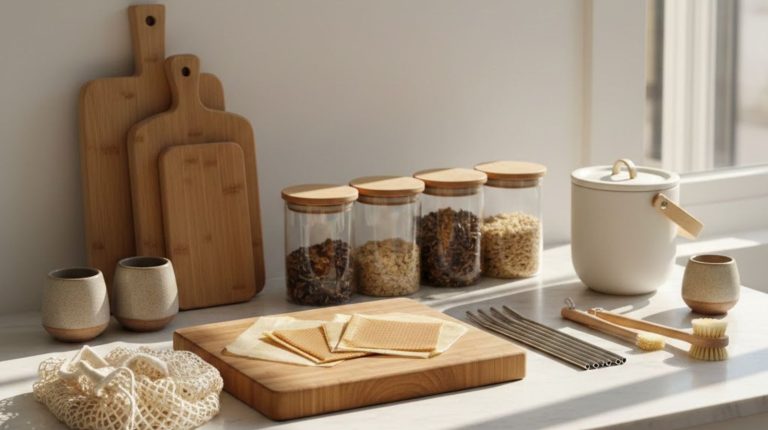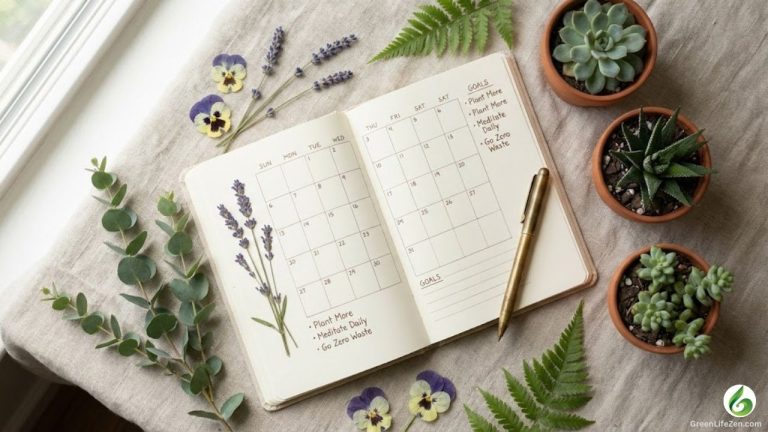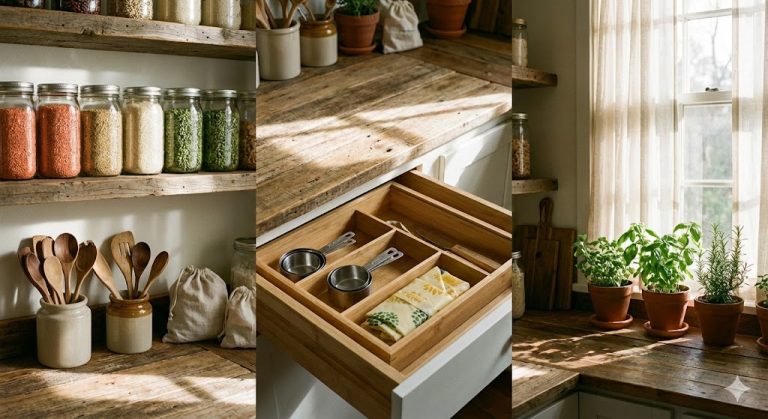Plastic pollution has become a pressing predicament, plaguing our planet with its pernicious presence. But fear not, fellow earthlings! We, as a united force, can foster change through plastic-free living. By embracing sustainable alternatives to plastic utensils, we can make a profound impact on our environment.
Metal cutlery, bamboo utensils, glass straws, silicone spatulas, and wood chopsticks are just a few of the eco-friendly options available. Together, let’s embark on this journey towards a cleaner, greener future.
Metal Cutlery
We often use metal cutlery as a sustainable alternative to plastic utensils in our daily lives. There are several benefits to using metal cutlery.
Firstly, it’s durable and long-lasting, reducing the need for constant replacements. This not only saves money but also reduces waste.
Additionally, metal cutlery is more hygienic compared to plastic as it’s easier to clean and doesn’t harbor bacteria. Speaking of cleaning, maintaining metal cutlery is relatively simple. It can be easily washed with soap and water or placed in a dishwasher for convenience. To keep the cutlery shiny and prevent rusting, it’s recommended to dry them thoroughly after washing.
Furthermore, metal cutlery can be recycled at the end of its lifespan, contributing to a circular economy.
Bamboo Utensils
Continuing the discussion on sustainable alternatives to plastic utensils, an excellent choice to consider is bamboo utensils. Bamboo utensils offer numerous benefits, making them an ideal option for those looking to reduce their plastic consumption.
Here are some key benefits of using bamboo utensils:
- Eco-friendly: Bamboo is a renewable resource that grows quickly and doesn’t require harmful pesticides or fertilizers.
- Durable and lightweight: Bamboo utensils are strong and long-lasting, making them perfect for everyday use. Additionally, they’re lightweight and easy to carry around.
- Natural antibacterial properties: Bamboo contains antimicrobial agents that help prevent the growth of bacteria on the utensils.
To ensure the longevity of your bamboo utensils, here are some tips on how to care for them:
- Handwash only: Avoid using a dishwasher as it can cause the bamboo to warp or crack.
- Dry thoroughly: After washing, make sure to dry the utensils completely to prevent any moisture from lingering.
- Oil occasionally: Apply a food-safe oil, such as mineral oil or coconut oil, to keep the bamboo moisturized and prevent it from drying out.
Glass Straws
As we delve further into sustainable alternatives to plastic utensils, it’s worth exploring the subtopic of glass straws.
Glass straws are becoming increasingly popular as reusable options for those looking to reduce their environmental impact. Unlike plastic straws, which contribute to the growing problem of plastic pollution, glass straws are made from durable and non-toxic materials. They can be reused over and over again, eliminating the need for single-use plastic straws.
Glass straws also offer a sleek and stylish alternative, adding a touch of elegance to any drink. Additionally, glass straws are easy to clean and maintain, making them a convenient choice for those seeking more sustainable options in their daily lives.
Silicone Spatulas
Moving on to the next sustainable alternative in our exploration of plastic-free living, let’s explore the versatility and benefits of silicone spatulas. These kitchen tools have gained popularity for good reason. Here are some of the benefits of using silicone spatulas in the kitchen:
- Heat resistance: Silicone spatulas can withstand high temperatures, making them perfect for cooking and baking tasks.
- Non-stick properties: Silicone is non-stick, which means that food easily slides off the spatula without leaving any residue behind.
- Durability: Silicone spatulas are long-lasting and resistant to wear and tear.
To ensure the longevity of your silicone spatulas, it’s essential to follow proper cleaning and maintenance tips:
- Hand wash: Clean your silicone spatulas by hand using warm water and mild dish soap.
- Avoid abrasive materials: Use non-abrasive sponges or cloths to prevent scratching the silicone surface.
- Store properly: Store your silicone spatulas in a cool, dry place to prevent damage.
Wood Chopsticks
Wood chopsticks are a popular and sustainable alternative to plastic utensils. Not only are they aesthetically pleasing, but they also offer numerous benefits.
One of the key advantages is their sustainable sourcing. Unlike plastic, which is derived from fossil fuels, wood chopsticks come from renewable resources. Many companies ensure that the wood used for chopsticks is harvested responsibly, minimizing environmental impact.
Another aspect that makes wood chopsticks special is their cultural significance. In many Asian countries, chopsticks are deeply rooted in traditions and are a symbol of togetherness and harmony. By using wood chopsticks, we can’t only reduce our plastic waste but also pay homage to these cultural practices.
Conclusion
In our journey towards plastic-free living, let’s embrace the beauty of nature’s alternatives.
Just like the delicate petals of a blooming flower, metal cutlery, bamboo utensils, glass straws, silicone spatulas, and wood chopsticks offer us sustainable choices that nourish both our souls and the environment.
By making these simple switches, we can create a ripple effect, transforming our everyday habits into a powerful force for change.
Together, let’s weave a tapestry of conscious choices, preserving the delicate balance of our planet for generations to come.




